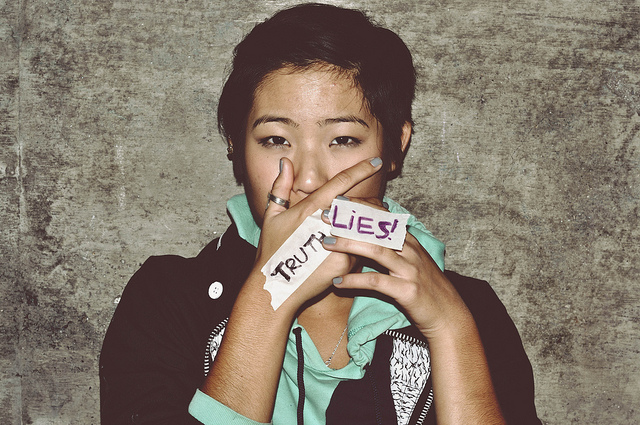Do you have questions about creating intimacy or developing mindful relationships?
Confusing questions? Awkward ones? Deep, dark scary ones? I want them.
Email your questions to: [email protected].
All relephant questions will be answered with loving kindness in this weekly column. (Yes. Every one.)
Authors remain anonymous.
No judgments, just soulful answers.
How do I stop assuming my live-in boyfriend is cheating?
I filter everything though suspicion though there is no evidence of cheating.
Been through hell and back from two exes and though through therapy I had healed, but here I am with a man who works to support me as I start a business, does many activities with me and is my best friend, yet I can’t stop my mind from going in a dangerous circle of what ifs.
What if he’s not at work? What of he’s at work but not alone there? Why did he say xyz like that? Why did his eyes shift like that? What if he is with someone else? What if, what if, what if…
I don’t vocalize these things to him because in the past when I have it hurt him and than got to the point he was just angry. (Can’t say I blame him.) I’m making myself insane. I don’t wanna lose this one, but don’t know how to stop the negative stories in my mind.
I’ve tried yoga, meditation, therapy and acupuncture, mantras, affirmations you name it.
What’s wrong with me? Is it my gut? Is he not the one? Am I just overly paranoid? Please help!
The first way to stop assuming your boyfriend is cheating is to stop.
You’ve said there’s no evidence of cheating. So? Just stop it. (And I promise that in a moment I will answer that, “But what if he is cheating?!” voice that just released its plaintive wail across cyberspace.)
The whole “cheating” thing is not the issue here: It’s trust. Cheating is an easy red herring to toss into the relationship because it is one of the deepest acts of betrayal we can engage in as a partner. For some, it is the absolutely worst thing a partner could do. If you’re going to worry, worry big!
In this case, why is cheating a red herring? First of all, a red herring is a logical fallacy that involves the arguer changing the topic from the core issue and using that new topic to build a case. The original topic here is trust. The red herring is infidelity. Logically speaking, without evidence, there is no infidelity. (“But maybe he’s hiding it? Really well! And when I find out I’m going to feel like such an idiot…” wails The Voice. Hang on. I’ll get to you.)
When we have distrustful thoughts about our partner, they likely originate, in part, from a lack of trust in our previous partners.
Perhaps that lack of trust was well earned; there are many forms of betrayal, not merely sexual. If we have a partner who takes us for granted, or criticizes us unfairly, or debases us…all these are major contributors to our feeling unrooted in our relationship.
There are other factors as well. Perhaps our parents—those people who offer us the model of what coupling should look like—cheated on each other. As adults, we stay vigilant about preventing that sort of behavior in our own lives, even when it is unwarranted.
Alternately, the conviction that our partner is cheating could be a cloak for a greater fear of true intimacy.
In other words, “If I assume s/he’s cheating, I’ve determined this relationship is not worth investing in fully.” We’re off the hook in having to go deep into our shadows and do the inner work that all healthy relationships need in order to survive. This puts us in control, even though it may feel as though we’ve lost control: We’ve put the brakes on by projecting bad behavior onto our partner.
Finally, there’s the other kind of projection: assuming the worst about our partner because it is really we who are unsatisfied and looking for a way out. It’s much easier to find fault with others than to own our needs.
One of my clients came to me tortured by obsessive thoughts that her boyfriend was cheating on her. She read his emails, stalked his Facebook account, and checked his texts with such frequency that her psychiatrist diagnosed her with OCD. (I called immediate bullshit on that.)
What helped her was to see that it was she who was worried about how close they were getting. She was unsure that this man was the one for her. She was, for example, a highly individual being who needed her solitude. How could she honor this when they eventually lived together? She was also only beginning to realize that she was a very sexually adventuresome person. Would he be able to accept her as such? Could he keep up? More importantly, did she want to spend the rest of her life with this one man as her only lover? Maybe she needed to experiment more…
Once my client learned more about her own shadow, she was able to see that she was in control of her life decisions. She developed a voice for her needs that she began to use, openly and with love, whenever she spoke with her partner. About two years later, he proposed. As far as I know they are still together.
So, now what?
Look inside. Are there any aspects of your self, your needs, that are not being met? Realize that you are worthy of all that you want in a relationship (or out of one). Be able to speak your truth and recognize that voice as a strong and valid one, even if it’s unsure. Once you’ve done that, are you now able to release your fear that your partner is cheating? If not…
Talk. I am a die-hard proponent of communication. Make some appropriate time to address your concerns. Not in an accusatory way, but more of an “I’m feeling vulnerable and weird and it’s manifesting itself as a fear that you’re being unfaithful” kind of way. If our partner truly cares about us and our feelings the initial response will be one of genuine tenderness and care. Along the lines of, “How did you come to feel this way? How can we fix this?”
Quell The Voice. Now I’ll address that voice that burns in our ears, asking all the niggling “What if?” questions. That voice is your friend. It’s the one who loves you so much it’s looking out for you like a snarling watchdog who barks at falling leaves. It’s a voice born of the gut-wrenching fear that we’ve fucked up yet another relationship and we’re going to be rejected and alone. It warns us that the ship is sinking even though it’s just a dripping faucet in the Captain’s cabin. But it’s not right.
Note that this voice is quite different from our intuition. Intuition guides us with wisdom and clarity. This voice screeches and wails like a banshee. Intuition elevates us. This voice depresses us. It actually mutes our intuition because it is based in fear, keeping us chasing our own tail. Intuition causes us to take precise, compassionate action.
Quell the voice. Thank it for its vigilance and care. Give it a kiss and a hair tousle and send it on its way.
Change your thoughts. There’s a saying that goes, “Worrying is praying for something you don’t want.” Manifestation works in mysterious ways! By changing your belief system from one of distrust and anxiety to one of acceptance and compassion, your energy will shift to peaceful state—a much more comfortable state for both of you to live in.
And if he is cheating? So what? That will have had nothing to do with you. It’s all him and his journey.
You have two choices: Stay or go. Whichever you choose will be the absolutely correct choice for you, now that you are empowered with the tools to know and honor your true self.
There are some couples who have been able to create a much more authentic relationship after infidelity. For them, it opens the doors to a level of communication they never had before. This is a theory held by relationship therapist Esther Perel. I’ll leave you with her TED Talk, “Rethinking Infidelity.”
Happy loving!
Bonus Video: Esther Perel, “Rethinking Infidelity…a talk for anyone who has ever loved”
Relephant Read:
Let’s Get Intimate: “The thought of sex disgusts me.” {Adult Q & A}
Author: Rachel Astarte
Editor: Emily Bartran
Photo: Flickr











Read 1 comment and reply